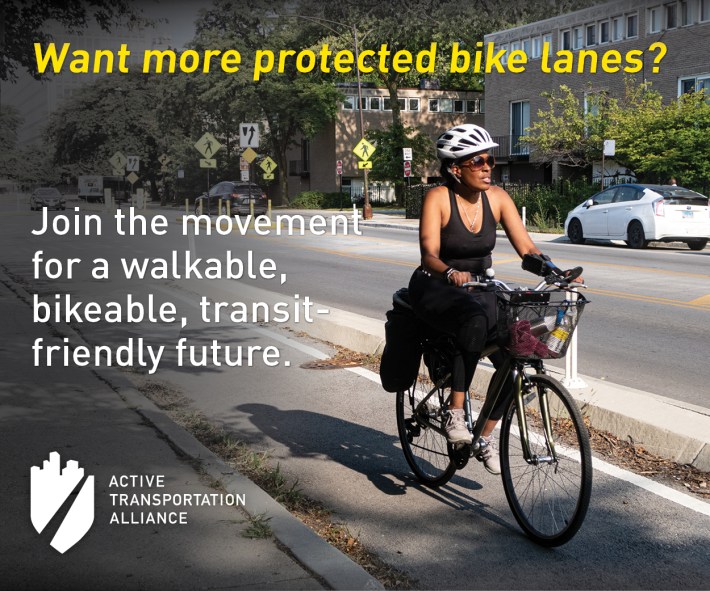
"And I thought to myself you're just like everybody else
Standing at the station, but missing the train
I turned to catch her expression
She walked back home in the rain"
- "The Next Big Thing" by Material Issue, 1992. The power pop trio's late singer-guitarist Jim Ellison lived in suburban Addison, in the 24th State Senate district.
I'm trying to leave no important stone unturned in Streetsblog's series of interviews of Illinois lawmakers playing key roles in the effort to address Chicagoland's impending $771 million transit fiscal cliff. Last week I had an eye-opening conversation with public transportation-friendly Republican (no, that's not a typo) far-northwest-suburban State Sen. Don DeWitte, the Minority Spokesperson on the Senate Transportation Committee.
So I figured this week I should talk to a Republican in the Illinois House who has also been heavily involved with transit discussions. However, my press contact for the Illinois Senate Republicans checked in with their counterpart in the other chamber, and that person said there didn't seem to be such an animal. (Since then, I did get a tip about a pro-public transportation House Republican, so I'll reach out to them in the near future.)
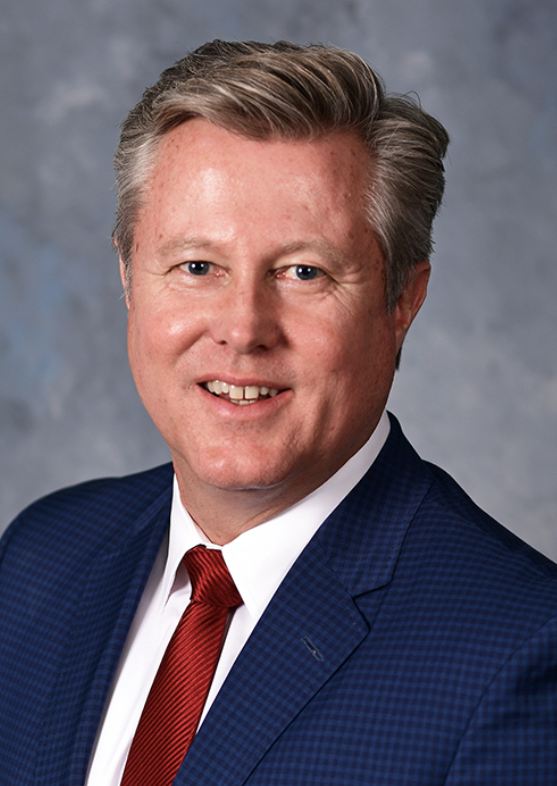
But my Senate press contact said GOP State Senator Seth Lewis (24th), who attended the December transit research trip to Germany with DeWitte and several Demoratic legislators, was also very interested in discussing the subject. His west-suburban territory includes includes all or parts of Addison, Bartlett, Bloomingdale, Carol Stream, Elk Grove Village, Hanover Park, Itasca, Roselle, Naperville, Warrenville, West Chicago, Wheaton, Winfield, and Wood Dale in DuPage and Cook counties.
This was another illuminating conversation with a Republican who seems to understand the value of safe, fast, frequent, and reliable bus and train service. It was more evidence that, even in the current contentious U.S. political climate, it never makes sense to immediately write someone off as a knucklehead simply because you may disagree with some of their policy positions.
The interview has been edited a bit for clarity and brevity.
John Greenfield: I understand that you're on the Senate Transportation Committee and you're based in Carol Stream. I assume that's a pretty "purple" area, since the senator before you who was a Democrat [Thomas Cullerton.] So I'm guessing there's kind of a mix of Democrats and Republicans out there. Is that correct?
Sen. Seth Lewis: That's correct. The seat actually was made in the remapping, so there was not an incumbent. It was an open seat in 2022.
JG: Oh, okay. So you went on the fact-finding trip to Germany. Tell me briefly about your experiences.
SSL: Sure. We learned a lot. The country of Germany does fund the majority of infrastructure, which is significantly different. But as far as coordinating schedules, as far as coordinating transit lines, I think there's a lot we can do here stateside, that we can learn from those models that we can implement here, which is what the [Northern Illinois Transit Authority] board is being charged with in the 85 pages of [HB 3438 legislation that passed the State Senate on May 31, but wasn't voted on by the House] that has already been developed, which I can agree with. A lot of it is building off of what we learned in Germany, and then that's related to safety. How do we keep the transit system safe? How do we have a single fare system? How do we have a single application, for example, on your phone, in which to maneuver to different transit lines that are owned by different transit agencies, things that we've been looking for here stateside for decades.
JG: So can you give me a description of how transit plays out to your constituents? What lines do people use? What buses are popular there? How important is it to your constituents that we save transit and preferably upgrade it?
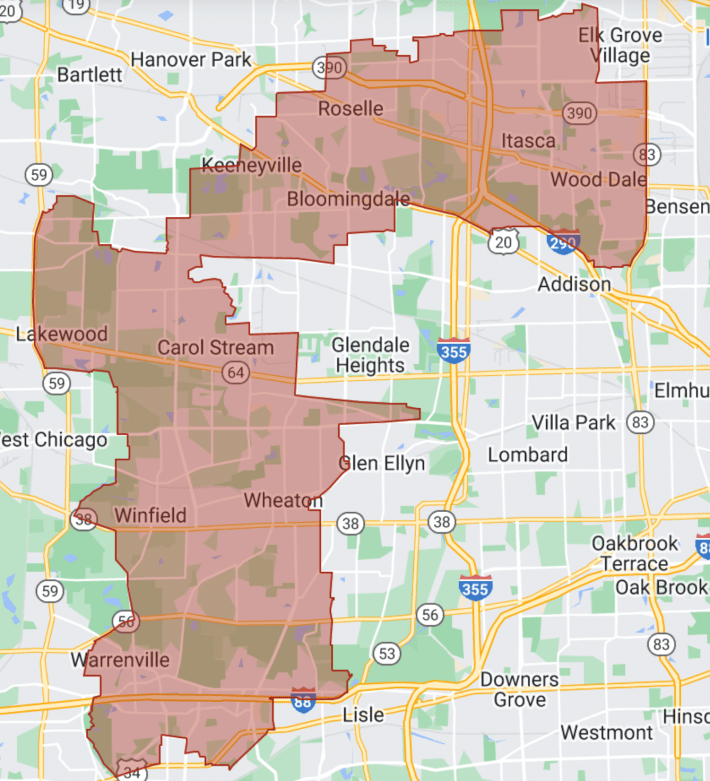
SSL: It's very important. So out of the 18 communities I represent, or partially represent, in the northwest suburbs of DuPage County, I want to say 15 of them have a Metra line running through them, or access very near. So Metra would be the transit system that is used most in my district. We do have Pace bus service. But pace is significantly less utilized by the general population just due
to frequency, and where it goes. It's difficult to have a robust suburban bus transit system when you don't have the population base to really utilize it. But the Paratransit portion, that Pace manages and implements, that is of significant concern to me, and my district, that cuts are not being made to Paratransit.
JG: Why don't we cut to the chase here and talk about a couple of hot topics. My interview with Sen. DeWitte was a nice conversation, because it was good to hear a Republican who definitely talks the talk of being very pro transit, and seems to really want to really want to solve this problem.
However, the Democrats and Republicans seem to have different attitudes about how to do this. And I know you folks all voted against HB 3438, and Sen. DeWitte explained why, why the Republicans chose to do that.
["We already knew there was a $1.4 billion tax increase coming in the new [general state] budget, DeWitte told me. "There was no way in Hell we were going to put any votes on a second billion-dollar-plus tax increase that would have affected every resident across the state of Illinois, not just the RTA metropolitan region."]
A couple of things Sen. DeWitte brought up, things where he seems to a have different point of view than the Democrats, whom he said he's friendly with, and they agreed...
SSL: Oh yeah, I mean we were all on the trip together.
JG: It's pretty cordial, right.
SSL: I mean, I got their cell phone numbers. We talked, not specifically about transit, but we talked about transit. I mean, it's a very cordial relationship that we have. And Sen. DeWitte and I have been leading the charge for almost two years now on the Senate Republican side to solve the problem, not to be obstinate or obstructionist, but to actually solve the problem.

JG: So it seems like the major differences are, DeWitte was taking sort of a
pragmatic approach, saying, "Our immediate problem is we have a $771 million transit fiscal cliff coming up next year. We really don't want to, we Republicans really don't want to raise taxes, because there was a large tax increase for the general budget. So here's a way we can, we can address that $771 million." He said the labor unions surprisingly, are willing to let the interest for the Road Fund be used for this, about $200 million. Then you've got the Wayfair tax on out-of-state internet purchases that would chip in something like $200 million. And he said that Governor [JB] Pritzker should use about $300 million in interest from the rainy day fund. So that would cover most of the $771 million.
I ran those, those ideas by House Majority Leader Eva-Dina Delgado the other day at a talk on Monday in Chicago, and she said that her issues with that are that, A, this isn't just a one-time problem. She actually presented a chart showing that the budget gap is just going to keep growing and get worse each year unless we come up with a reliable, larger funding source, so they're shooting for 1.5 billion a year.
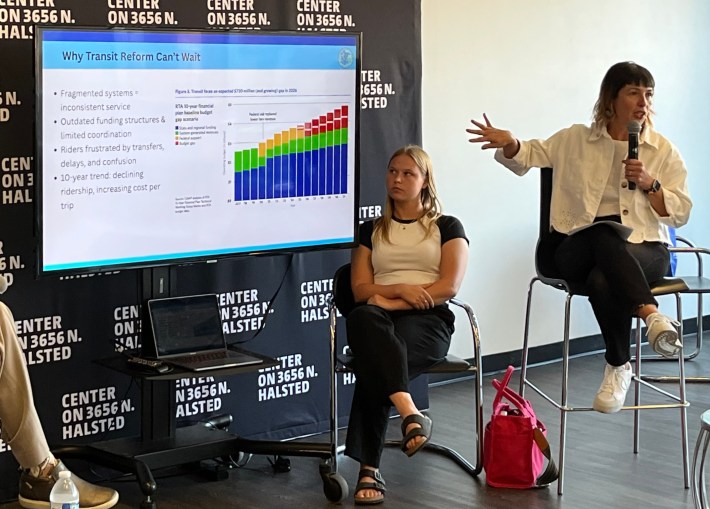
And then the other thing she said is that we're not currently facing a rainy day. Senator DeWitte said we are. I'm kind of sympathetic to that idea, because Philadelphia seems like a mess right now. SEPTA just did massive transit cuts. They're raising their fares 21.5 percent like, we really don't want that to happen in Chicagoland.

So even if we assume this is a rainy day situation, she made what I thought was a valid point, which was, "Well, if we're using the rainy day fund this year, we're still going to have a budget gap next year. And then where are we going to get $300 million?"
So, so what do you think of those two arguments from Leader Delgado, whom I know you're friendly with? A, we need more money right now to address future transit funding gaps. And B, using the rainy day fund is a real stopgap measure, because it won't be there next year.
SLL: I understand both points. I'm in the middle on this, meaning I understand these are one time or revenue enhancements. I would like to see a sunset clause on this funding proposal of three years. And the reason I say that is because we're talking about reforming about a $4 billion transit agency. It is the old board, the [Regional Transportation Authority] board, that gave us the number of $750 million, and we're talking about taking their number that we disagree with how they're running things. This is why we're having governance reform and new appointments. Everyone loses their appointments with the new NITA board. They have to be reappointed. But we're using RTA's math and then doubling it to 1.5 billion.
I believe the new NITA board should have the opportunity to come up with their own proposal. What do they need? What does the fare structure look like? What does safety mean? What does reliable transportation mean? We're giving the proposal is to get 1.5 billion to an old entity that we don't trust to begin with. Why would we do that? That would not happen in the private sector. You would actually reform and then charge the new administration or this new board with coming up with a proposal.
JG: So what you just said is you're in favor of coming up with enough funding to
temporarily stop the bleeding, get the $771 million, get the new NITA board in charge, and then have the new NITA board decide how much money is needed in the future?
SSL: Yeah, because there's also been proposals, I forget by who, that the reformed transportation system will save anywhere from $60 million to $200 million. So we have no idea what the cost savings truly are. We have no idea when we start planning routes and actually identifying how a Pace bus can enhance a Metra ride, that can then enhance a CTA bus line to the Museum Campus. Will that drive additional traffic will receive additional revenues as people are using transportation more often? We know none of that right now, and to say they need $1.5 billion right out of the gate, I think that's unfair to the to the Illinois taxpayers and residents who are going to fund it. But should we lose capacity right now? Absolutely not. Which is comes to the, "Let's fund the fiscal cliff for three years." Because I think it'll be taking about three years for the new NITA board to figure this out.
JG: One thing that's nice about this issue that we touched on earlier, is that even though Illinois Republicans and Democrats disagree on a lot of stuff, the transit fiscal cliff is a common enemy. And at least in transit-friendly suburbs, like the ones you you represent, all politicians, it doesn't matter if you're Democrats or Republicans, you're going to look terrible if you don't pass something to save and preferably upgrade transit. So it definitely makes sense for you folks to work together.
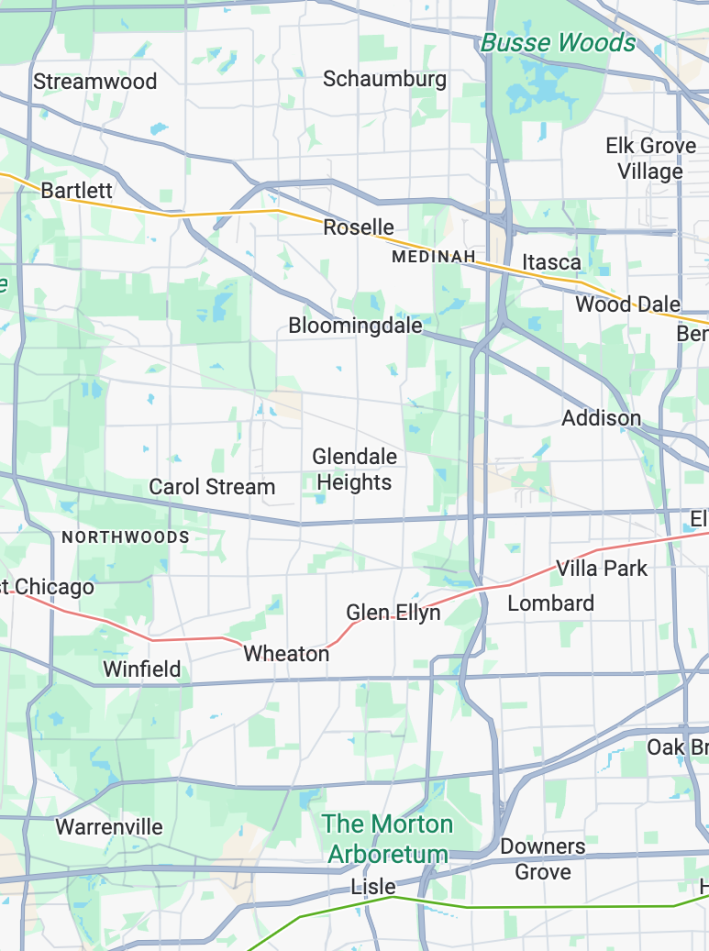
And we've discussed the differences of opinion. The Republicans like you, are pretty much dead-set against tax, fee, and surcharge increases. The Democrats that I've talked to seem to be pretty much dead-set on the position that we've got to get to $1.5 billion now, and it's worth it to do these extra increases. A recent study found that $1 spent on Chicago the way on transit kicks $13 in the economy. So I can see that argument.
But the most important thing is that we pass something, much preferably during the October veto session. Since you've been a baseball, basketball, and football coach, can you give us a good sports analogy of what's going on right now with both the Democrats and Republicans trying to get this thing passed in time to avoid the projected 40 percent service cuts and 3,000 layoffs?
SSL: Well, like in the sports world, time's been added to the clock. We were not aware of the extra $250 million that came in through the Wayfair tax. We were not privvy to RTA being able to transfer at least $74 million into the different agencies to stave off the fiscal cliff for at least six months, if not a full year. Reports are coming out that the fiscal cliff may not happen in 2026 as was originally reported, which is why I think you've seen leadership from the governor, Senate President [Don] Harmon, Speaker [Emanuel "Chris"] Welch, who run both chambers.
This has not been, in my perspective, very urgent for them. I mean, we did run the bill at 11 o'clock at night on the last day [of the spring legislative session, May 31]. Things that have a sense of urgency grew much quicker than these transit talks have been going. And the House didn't vote on [HB 3438] that night. So where people are believing [October] veto session is the end of the game, I
think we're seeing some things happen in spring session, and it's not the looming crisis that's immediate.
JG: Okay, so what you just said is that you don't think we necessarily need to pass this in October, but it would be okay to wait until the spring legislative session?
SSL: Yes.
JG: Okay, well I'll have to run that by the Democrats and see what they think. I hadn't heard that before.
SSL: [Laughs.] Like I said, the reason being the the extra $250 million that no one knew about. Transit agencies themselves are saying they're not sure they have to make the cuts in early '26 that we talked about. And the governor, he did not put his thumb on the scale at all during the spring session.
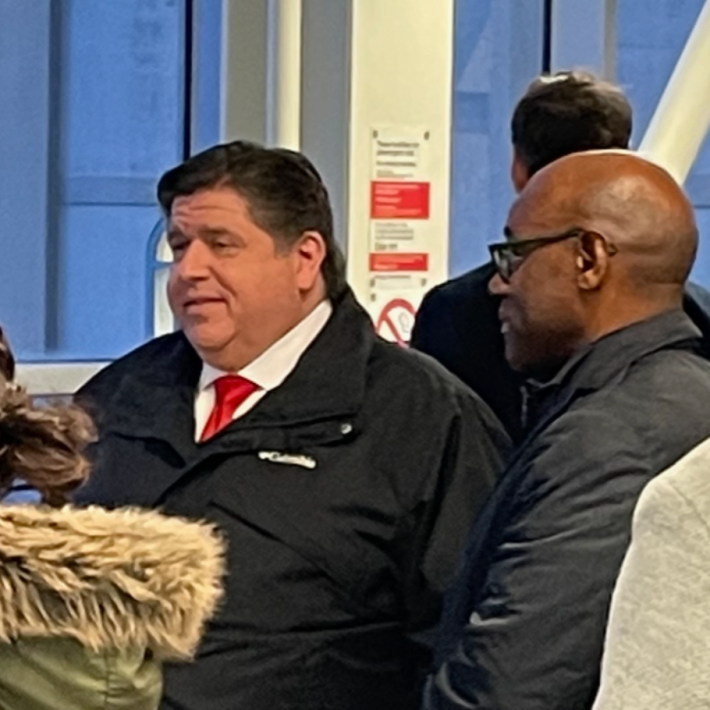
JG: Right. He was pretty quiet.
SSL: And he still hasn't put his thumb on the scale.
JG: Yeah, the main thing he did after HB 3438 didn't pass was scold the RTA for spending money on advertising to lobby legislators.
[Pritzker on June 1: "[RTA would] have more money in their coffers if they hadn’t spent money advertising here in Springfield to try to convince people something that they really should be leaving to the legislators to decide."]
Although he did recently say he's optimistic that they can pass this in October.
[The governor in late August: "There is a bill that’s being developed and resources associated with that bill that will come forward at the time of our veto session in October. There’s still a lot of work being done — lots of it has been done already. But . . . it’s not soup yet."]
SSL: The voter threshold during the veto session. You had bipartisan opposition to the original bill. [All Senate republicans and a handful of Democrats voted against HB 3438 on May 31, but it garnered the then-necessary 51 percent of votes to pass.] And now the threshold goes from 30 to 36. [In the veto session, a 60 percent supermajority is required.] I think that original bill only had 32 yes votes on it. So the Democrats had to do some arm twistin' in the Senate that day, and the House wouldn't even call transportation bill. You need 71 out of 78 [Democratic votes in the House to pass legislation with a supermajority. That's what what was needed after midnight at the end of the spring session, and would be needed during the October session.]
JG: Well, it's certainly in the interest of the Democrats to get some Republicans onboard with a transit bill. It'd be possible for them to pass it with a supermajority in October without without help from transit friendly Republicans. But if they can get you and DeWitt, and other people who really care about transit, to vote for it, that would be a big help in getting a supermajority.
SSL: It would, and you have to fix the governance side of that also. So that is a bigger issue for suburban Republicans, ceding control to the mayor of Chicago with the transit authority, with the new NITA board, and potentially shutting out the suburban collar counties. And I know probably what you're going to say is you talked to Eva-Dina, and she said that's unlikely to happen. So if it's unlikely to happen, let's put it in legislation.
JG: She said something to the effect that she agrees with DeWitte that it would be good if most NITA votes required support from two people [out of five board members] in each of the four factions. And one of those four groups would be made up of representatives of the five suburban color counties. [The other three factions of five board directors would be appointed by the mayor of Chicago, the Cook County board president, and the governor.]
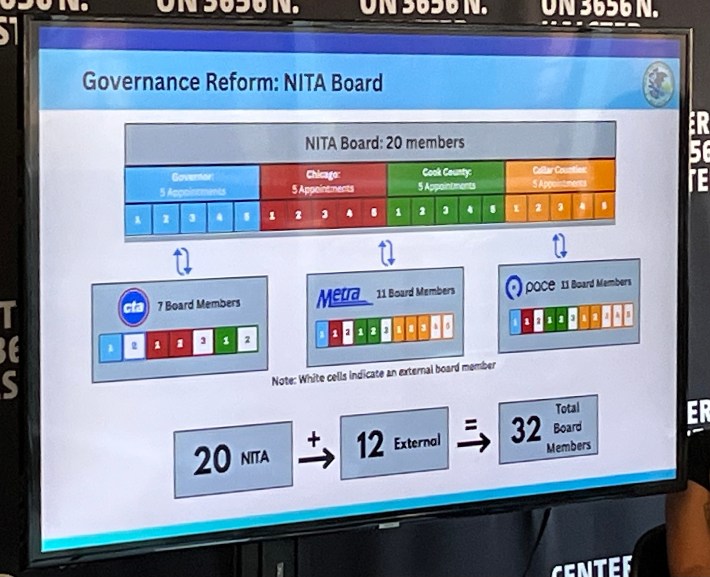
The proposed transit governance restructuring, discussed at Monday's panel, which would replace RTA with the Northern Illinois Transit Authority. It would also shrink the CTA, Metra, and Pace boards, so that there would only be 32 total board directors instead of the current 47.
But then she mentioned another scenario where it would be possible to override that requirement. I guess I could see the argument for not not allowing that, so that no matter what, you gotta have two-fifths of the suburban contingent agree to something.
SSL: That's the issue. You know, this is scheduled for the next 50 years. What [suburban lawmakers are thinking is] suburban, or Cook County, or City of Chicago, none of these camps [should be able to] be overridden. They have to work together, which is the main premise of reforming RTA and the NITA board. is that, as it stands, the transit agencies don't work together. And now we're going to have a voting structure where you can allow people to not work together. That's counterintuitive.
JG: Yeah, you don't want to have a situation where it's impossible to get something approved. But you also don't want to have something where the majority is able to steamroll over the minority.
All right, this interview has gotten pretty long, so why don't we call it, unless you have something else to say.
SSL: No, I think it's been a friendly conversation.
JG: Yeah, I agree.
Check out our interview with House Speaker Welch about public transportation funding here.
Read Streetsblog's recent interview on this topic with Senate President Harmon here.
Read our interview with Sen. Villivalam on this subject here.
Check out our interviews with State Sen. Mike Simmons and State Rep. Hoan Huynh on the topic here.

Do you appreciate Streetsblog Chicago's paywall-free sustainable transportation reporting and advocacy? We officially ended our 2024-25 fund drive in July, but we still need another $43K+ to keep the (bike) lights on in 2026. We'd appreciate any leads on potential major donors or grants. And if you haven't already, please consider making a tax-deductible donation to help us continue publishing next year. Thanks!




